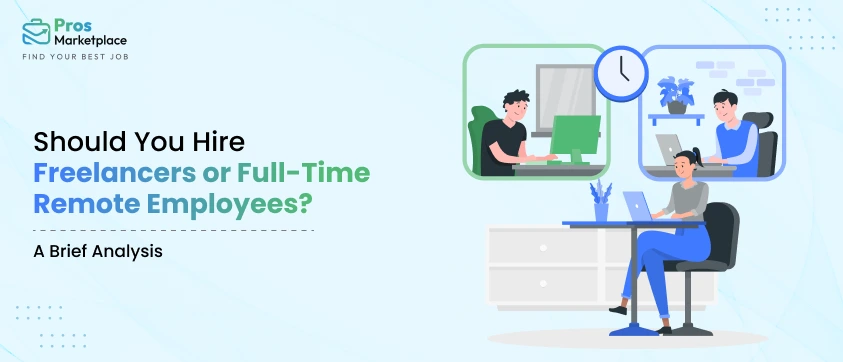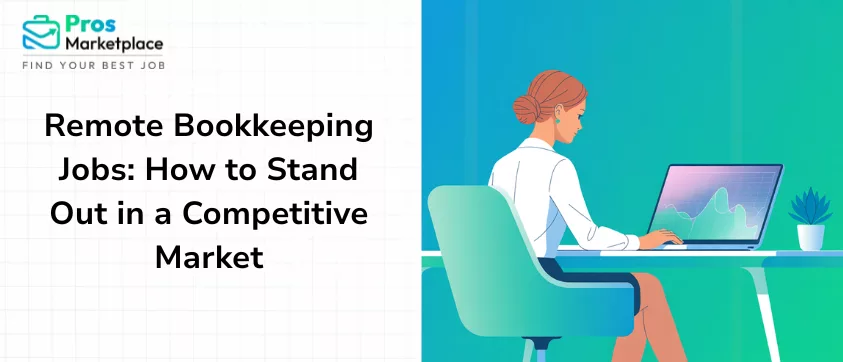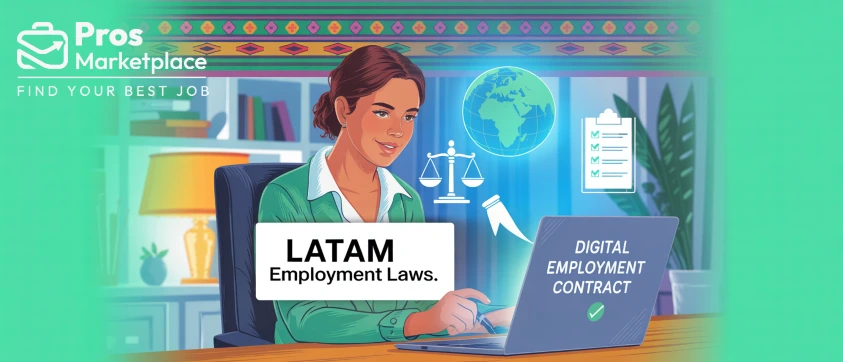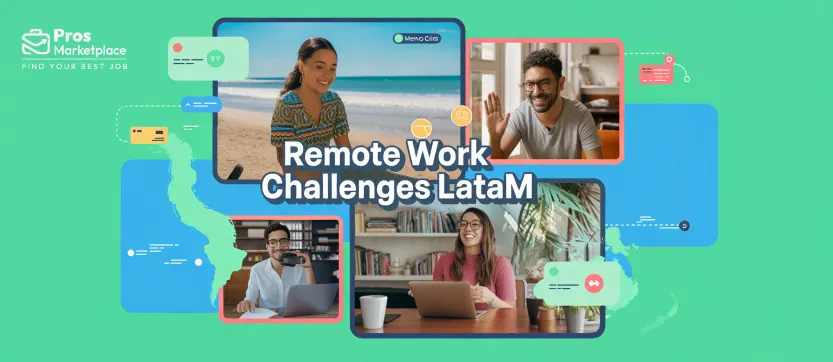Did you know? According to Fiverr, 78% of companies shifted to relying on freelancers over full-time staff in 2023. With more people transitioning from traditional nine-to-five jobs to pursue self-employment and freelancing, businesses face a critical decision. Should they invest in freelancers or hire full-time remote staff? What drives organizations to choose one over the other, and what are the advantages and challenges of each option?
In this blog, we’ll explore these questions and help you determine the best choice for your business.
What You Need to Know About Freelancers
Freelancers are independent service providers who offer their skills and services to different clients on a project-by-project basis. They have the flexibility to choose their clients, projects, and schedules. Freelancers vary in the disciplines, including writing, graphic design, software development, marketing, and consulting services. Their work often involves juggling multiple tasks for different clients, and they are usually paid per project, task, or hour.
While freelancers enjoy the freedom of self-employment, they also handle the business aspects of their work, such as client acquisition, rate setting, and taxes. Let’s explore the major advantages and challenges of hiring freelancers.
Specific Skills
Freelancers often possess unique expertise that your employees may not have. For instance, if you’re launching a mobile app, a freelance developer can handle specific features while your in-house team focuses on the overall strategy. Freelancers stay up-to-date with industry trends, making them invaluable for specialized tasks.
Quick and Easy Setup
Hiring freelancers is faster and simpler than onboarding full-time employees. For example, when you want to urgently create an advertisement requiring graphic designers, you will not undergo all the time-consuming onboarding processes; instead, you get them onto the project immediately. A freelancer doesn’t need to learn all about your company’s mission, vision, or goals—they only need to know clearly about the project at hand, so they can directly jump into their work.
Lower financial risk
With freelancers, you pay only for the work completed. For instance, if your company requires a one-off marketing campaign and the project scope changes midway, adjusting the budget will not be as costly. On the other hand, laying off a full-time employee for reasons like poor performance or financial constraints can be costly in terms of severance packages and other benefits. With freelancers, the costs are controllable, and you can part ways with them if needed in the future.
Flexibility
Freelancers offer flexible services, enabling you to hire them on a project basis. For instance, in case your in-house marketing team is overburdened because of an upcoming product launch, you can hire a freelancer to manage your social media for a while. This ensures that you pay for their expertise only when you need it without the long-term commitment of a full-time employee.
In many ways, hiring freelancers offers flexibility, specialized skills, and cost-effectiveness; however, it is crucial to look at the negatives involved. The next section provides us with the cons of employing freelancers, which includes risk in long-term collaboration and consistency. This means that both sides will decide whether or not it should include freelancers as part of its business model more efficiently. Let’s now consider the cons of hiring freelancers.
Lack of Loyalty
Freelancers often work for multiple clients, which can lead to limited commitment to your organization. They are often interested in short-term goals, get a job done, and then get paid and move on to the next project. Thus, a freelancer might design a website for your company with very little interest in understanding how that website will fit your overall brand vision because, at the end of the day, they want to simply finish the project and move on to their next client.
Communication Challenges
Since most freelancers work remotely, there could be a significant problem with communication, especially in different time zones. The example of a marketing freelancer based in another time zone who is only available in your off-hours means there could be delays in the coordination of urgent changes or lack of timely resolution of issues at hand. Such disconnections could lead to delays or misunderstandings on the expectations of the project.
Unpredictable Quality of Work
The quality of work done by freelancers can depend on their experience and the time they have for every project. Rushing to hire a freelancer to meet a deadline may not ensure they have the necessary capabilities, potentially resulting in subpar work. For instance, hiring a content writer without checking out their previous work may leave you with low-quality articles that you have to spend time and resources replacing and correcting.
Cybersecurity Threats
Since freelancers utilize their equipment and software, you cannot extend the security measures of your systems to theirs, leaving open the possibility of further cyber threats. For example, if a freelance developer works on your project using an unprotected laptop, they may inadvertently release sensitive company data to hackers. You should confirm that freelancers follow cybersecurity best practices to ensure adequate protection.
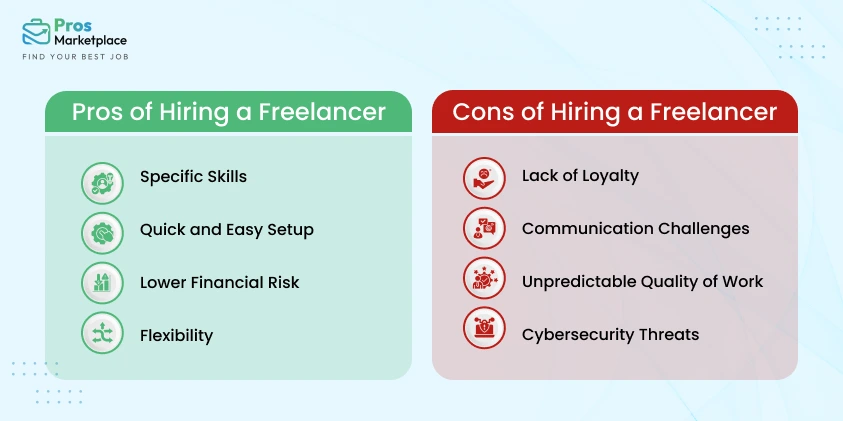
Why Should You Hire a Full-time Remote Employee?
Full-time remote employees offer unique advantages that contribute to long-term success and team stability. Their commitment, teamwork, and availability contribute to long-term success and a stable work environment. Here’s why it’s worth considering:
Dedication and loyalty
The company culture, mission, vision, and values often align very well with full-time employees. As such, this would be a more long-term commitment, with employees usually committed to the organization and working to further its success. Such loyalty can prove invaluable in a workforce that is passionate about work and motivated to contribute toward the company’s goals in the long term.
Team Cohesion
Being a part of a consistent team, full-time employees get to bond with colleagues and develop strong supportive relationships. Cohesion increases collaboration, which makes them work efficiently and achieve common goals. The stable team dynamic helps employees integrate well into the system, making it easy for them to work in an environment full of trust and mutual support that drives success and accelerates their ability to contribute effectively.
Continuous Availability
Full-time employees are always available for meetings, discussions, and collaborative work sessions. They will continually engage with the team. The availability of freelancers might be limited. Full-time staff will always be more accessible when they are needed. This makes them reliable to keep your team aligned and responsive to the demands of the business. It will make your workflow more organized and seamless.
Better Team Building
Full-time employees find it easier to create a cohesive and effective team because they have worked for the company for a long time. They can interact meaningfully in team meetings, video calls, and departmental activities, bringing about a deeper sense of camaraderie and teamwork. Employers can invest time in training full-time team members, enhancing their skills and loyalty, ultimately leading to higher productivity and long-term success.
Cons of Hiring a Full-Time Remote Employee
Although hiring a full-time remote employee offers many benefits, it is not without its challenges. Knowing the potential downsides can help businesses make a well-informed decision about whether this is the right choice for their needs. Here are a few cons to consider:
Long-Term Investment Commitment
Hiring a remote full-time employee is a significant investment in the long term, requiring proper planning and budgeting. One needs to evaluate whether it is a worthwhile commitment and whether the role aligns with your company’s long-term goals. Though this is beneficial in the long run, it requires long-term contracts, so businesses must be ready with their financial management even during tough times.
Higher Operational Costs
The operational costs of full-time remote employees are higher because they entail salaries, medical insurance, paid leave, and retirement benefits. All these can be very expensive and would make a business spend a lot of money, which some startups cannot afford. Thus, some opt for freelancers instead of full-time employees.
Limited Skill Diversity
Full-time remote employees tend to focus on specific, repetitive tasks and may lack the versatility offered by freelancers. Freelancers often bring a broader range of skills and can quickly adapt to new technologies and challenges, which may be harder to find in a full-time remote worker dedicated to one organization.
Higher Hiring Risks
Hiring a full-time remote employee is at higher risk. If such an employee does not measure up, terminating them becomes both expensive and time-consuming. Full-time employees cannot be hired on a project like freelancers, and hiring involves substantial financial resources for their recruitment and severance in case of termination, making this a very important hiring decision.
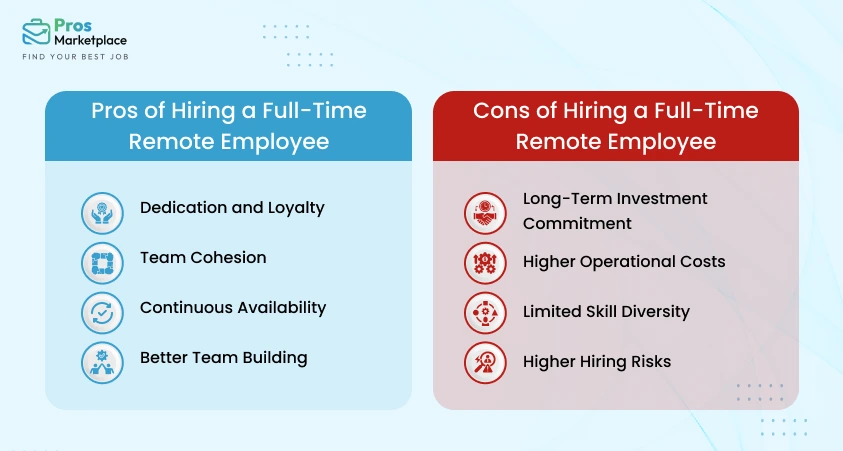
Conclusion
Deciding between hiring a freelancer or a full-time remote employee depends on your business needs. Freelancers are ideal for short-term projects, and flexible scaling, offering cost-effectiveness and reduced financial risk. They bring specialized skills to the organization for a defined period without long-term commitment or higher operational costs with full-time employees.
Conversely, if the growth of your company relies on long-term, cohesiveness, and stability, hiring a full-time remote employee may be just the solution. Such employees will form a core part of your team and, most importantly, they share your company’s values, leading to a bright future for the company. This decision requires a clear understanding of your company’s goals, financial situation, and specific needs.
